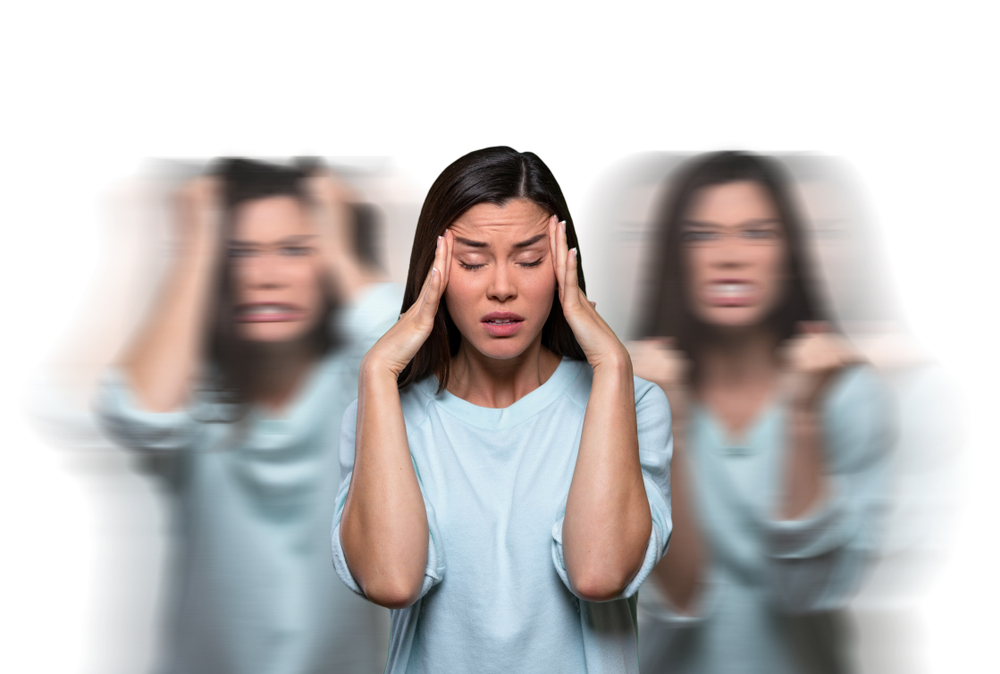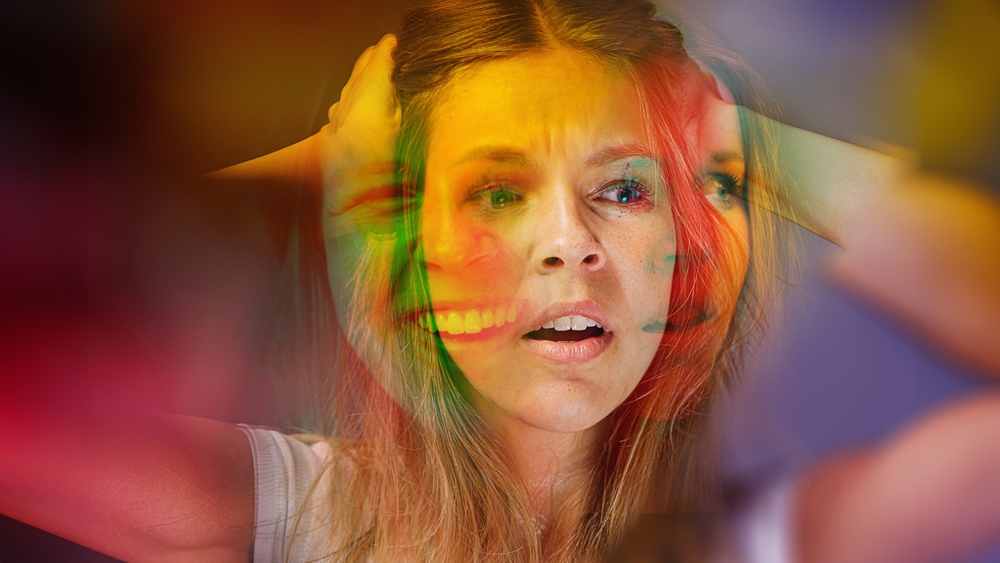Last Updated:
July 21st, 2025
Bipolar and Addiction | Symptoms and Support Options
What is bipolar disorder?
Bipolar disorder is a mental health condition that causes extreme shifts in mood, energy and behaviour. These mood swings go beyond everyday ups and downs, shifting between manic (or hypomanic) highs and depressive lows.
According to Bipolar UK, bipolar disorder is one of the most common long-term conditions in the UK, affecting around 1.3 million people. That’s roughly 2% of the population, making it more than twice as common as conditions like dementia, epilepsy, autism, rheumatoid arthritis and learning disabilities. These figures highlight just how significant and widespread bipolar disorder is.

Are there different types of bipolar disorder?
Bipolar disorder presents in several forms, each with its own pattern of mood changes and symptoms. Understanding the differences can help recognise the condition and find the right support.
Bipolar I disorder
Bipolar I is diagnosed when someone experiences at least one manic episode, which may be preceded or followed by hypomanic or depressive episodes.
Manic episodes may involve:
- Elevated or irritable mood
- A surge in energy
- Little need for sleep
- Overconfidence or grandiosity
- Rapid speech and racing thoughts
- Poor judgement and risky behaviour
Depressive episodes often include:
- Low mood and fatigue
- Difficulty sleeping or oversleeping
- Changes in appetite
- Feelings of worthlessness
- Thoughts of self-harm or suicide
Manic episodes in Bipolar I can be severe and may require hospital care or cause significant disruption to daily life.
Bipolar II disorder
Bipolar II is defined by at least one major depressive episode and at least one hypomanic episode but no full manic episodes.
- Hypomanic episodes share similar traits with mania but are less intense and typically don’t require hospitalisation.
- Depressive episodes mirror those in Bipolar I and can be long-lasting and deeply distressing.
What separates Bipolar II from Bipolar I is the absence of full manic episodes, even though the depressive symptoms can be just as challenging.
Cyclothymic disorder (Cyclothymia)
Cyclothymia involves chronic mood fluctuations that include hypomanic symptoms and mild depressive symptoms, without meeting the full criteria for a hypomanic or major depressive episode.
These symptoms may include:
- Noticeable shifts in mood and energy (though less intense than Bipolar II)
- Ongoing low periods that interfere with day-to-day life but aren’t as severe as clinical depression
To be diagnosed with cyclothymia, these symptoms must be present for at least two years in adults (or one year in children and teens) with no symptom-free stretch longer than two months.
Each type of bipolar disorder requires tailored treatment and support, which is why accurate diagnosis is so important.
Is there a link between bipolar disorder and addiction
Research has shown a strong connection between bipolar disorder (BD) and substance use disorders (SUD), with high rates of co-occurrence across different populations.
A review and meta-analysis of clinical studies identified 22 multi-site studies and 56 single-site studies reporting SUD and BD co-morbidity rates in both inpatient and outpatient settings.
Findings revealed that:
- Alcohol use disorder was the most common co-occurring SUD, affecting 42% of individuals with BD.
- Cannabis use disorder was the second most frequent, present in 20% of individuals with BD.
- Any drug use disorder, including cocaine and amphetamines, was reported in 17% of cases.
- Individuals with both BD and SUD experienced an earlier age of onset and slightly higher hospitalisation rates than those with BD alone.
These findings highlight the complex relationship between mood disorders and substance use, emphasising the need for integrated treatment approaches that address both conditions simultaneously.

What fuels the link between bipolar disorder and addiction?
There isn’t a single, clear reason why bipolar disorder (BD) and substance use disorders (SUD) frequently co-occur. Instead, a combination of factors contributes to this complex relationship. People with BD may turn to substances for different reasons, depending on their mood state and personal experiences.
Here are some research-backed possibilities:
A way to regulate emotions
One of the most common reasons is using substances to regulate emotions. Individuals with BD may drink alcohol or use drugs to boost their mood, relieve tension, escape reality or alleviate boredom. Some seek euphoria or increased energy, especially during depressive phases when they feel drained.
Self-medicating
Another key factor is self-medication. People with BD often experience extreme mood shifts, and substances may seem like a way to manage these fluctuations. Stimulants like amphetamines and cocaine can mimic or prolong manic episodes, making individuals feel more energetic and powerful. On the other hand, sedatives are often used to numb feelings of sadness, anxiety or hopelessness during depressive episodes.
Seeking to relive the ‘mania’
Some individuals also develop an “addiction to mania”, a desire to recreate the high-energy, euphoric state of hypomania or mania. Since these elevated moods can feel empowering and boost self-esteem, some people try to maintain them artificially through substance use, even at the risk of worsening their condition.
How are addiction and bipolar disorder treated in rehab?
Treating both addiction and bipolar disorder at the same time can be complex, as each condition comes with its own challenges. However, many rehab centres offer integrated treatment plans that address both issues together, giving individuals the best chance at long-term recovery and emotional stability.
The first priority is usually to stabilise bipolar disorder before beginning addiction-focused treatment. If bipolar symptoms are not under control, it can be difficult to engage in addiction therapy or maintain progress fully.
Once stability is achieved, detox is usually the first step in treating addiction, helping to clear substances from the body safely.
Once detox is complete, therapy to treat both conditions side by side can begin:
- Dialectical Behaviour Therapy (DBT) is commonly used in rehab for co-occurring disorders. It helps individuals manage difficult emotions, reduce impulsive behaviour and build better coping strategies. These skills are particularly useful for people dealing with mood swings and urges to use substances.
- One-to-one therapy provides a personalised space to explore the underlying causes of both addiction and bipolar symptoms. It can help individuals process past trauma, manage anxiety or low mood and develop healthier ways to respond to emotional distress.
- Group therapy also plays a key role. It offers a sense of connection and support, especially for those who may feel isolated or misunderstood. Talking with others who are facing similar challenges can be a powerful part of the healing process.
Aftercare support is vital, too, especially since bipolar disorder can involve ongoing mood fluctuations. Continued group sessions, support groups and check-ins after rehab can help maintain both emotional balance and recovery from addiction over the long term.
What are the next steps?
Addiction Helper provides fast, confidential support for anyone facing drug, alcohol or behavioural addiction. Our expert team can guide you through treatment options and find the best path for you. Take the first step toward a healthier, more stable future. Reach out to Addiction Helper today for the support you deserve.
Our compassionate team are ready and available to take your call, and guide you towards lasting the lasting addiction recovery you deserve.
Frequently Asked Questions
(Click here to see works cited)
- Preuss UW, Schaefer M, Born C, Grunze H. Bipolar Disorder and Comorbid Use of Illicit Substances. Medicina (Kaunas). 2021 Nov 17;57(11):1256. doi: 10.3390/medicina57111256. PMID: 34833474; PMCID: PMC8623998.
- “Bipolar – the Facts.” Bipolar UK, www.bipolaruk.org/faqs/bipolar-the-facts. Accessed 21 March 2025.

